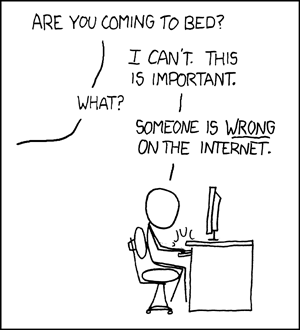Agreed. Worked at an ICF/MR facility where someone who was mildly intellectually disabled (with severe aggressive behaviors) had a behavior plan (learning-based supports) that came under scrutiny of an executive committee of non-clinicians (administrator types). Sure, there were other (non-psychologist) clinicians in the room but nobody who was behaviorally trained. This was also during the height of the 'no punishment' era. So, the folks who had written the plan (which I was defending, in their absence (whole 'nother story)) had written a plan that basically had a Path A and a Path B (in terms of the client's daily schedule of activities and opportunities for reinforcement) which was contingent upon the absence of aggressive behavior. Meaning, if the client exhibited certain clearly aggressive behaviors (hitting, kicking, trying to stab someone with a steel utensil), they were to go through 'Path B' (which was a relatively sparse daily schedule of opportunities to earn reinforcement, say (or less 'enriched') and also had the safety element of not allowing that person access to metal utensils (which she had, say, just tried to stab others with). So, I'm defending this plan and make the mistake of trying to explain to some non-professionals the thinking behind the plan and they kept objecting to the 'negative' consequences of the person being given a less enriched daily schedule of reinforcement because to them it was 'punitive' and not in line with our philosophy of 'positive behavior supports' which, ideologically (according to them), meant that we didn't consequate 'bad' behavior with 'punishment.' I tried (in vain) to make the distinction between how the term 'punishment' is used in lay language vs. the very technical meaning of the term to a behavior analyst (basically, a punishing consequence is one that, empirically, lowers the future frequency of the behavior upon which it is contingent) but to no avail. One administrator even smirked and sarcastically said, 'Oh, Dr. X is trying to explain to us that there are different definitions of punishment and when they use punishment it's not like when we use punishment.' I'm like...yeah, basically...that's right, jackass. He was a politician type and he thought that he had 'caught' me dissimulating and trying to somehow manipulate the audience. Whatever, the point is that to these people (and to anyone else who is so ideologically possessed by the idea that 'PUNISHMENT = DA DEVIL OMFG!!!!!!!!' even a slightly less reinforcing alternative is 'punitive' in their eyes and should never be implemented. By that logic, therefore, we should never treat ANY behavior any different than any other behavior.
Now all of these non-psycholgists were thoroughly drenched (and had been for more than a decade) in the philosophy of 'positive behavior supports' and the ideology of 'non-punishment' and the idiotically utopian vision of a world without pain, unicorn farts, and endless rainbows. They were so ideologically infected with the idea that they actually would argue (if you followed their reasoning) that a violent person who had just tried to stab staff with a metal knife had the right to not have their access to said metal knife taken away from them (even temporarily) because it would be 'inconsistent with a philosophy of positive behavioral supports.' This is the danger of such philosophies in the absence of either (a) competent professional training or (b) common sense.


